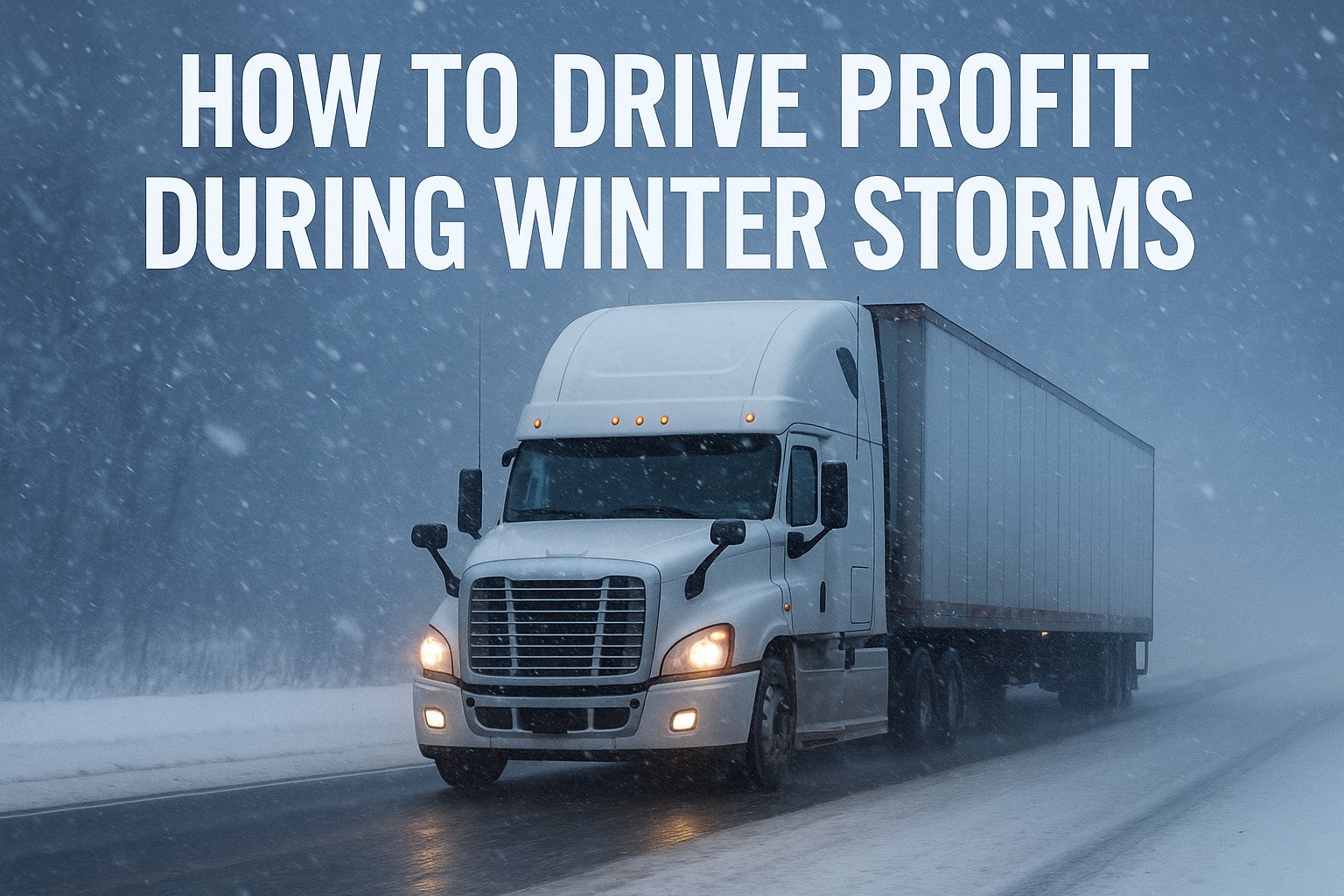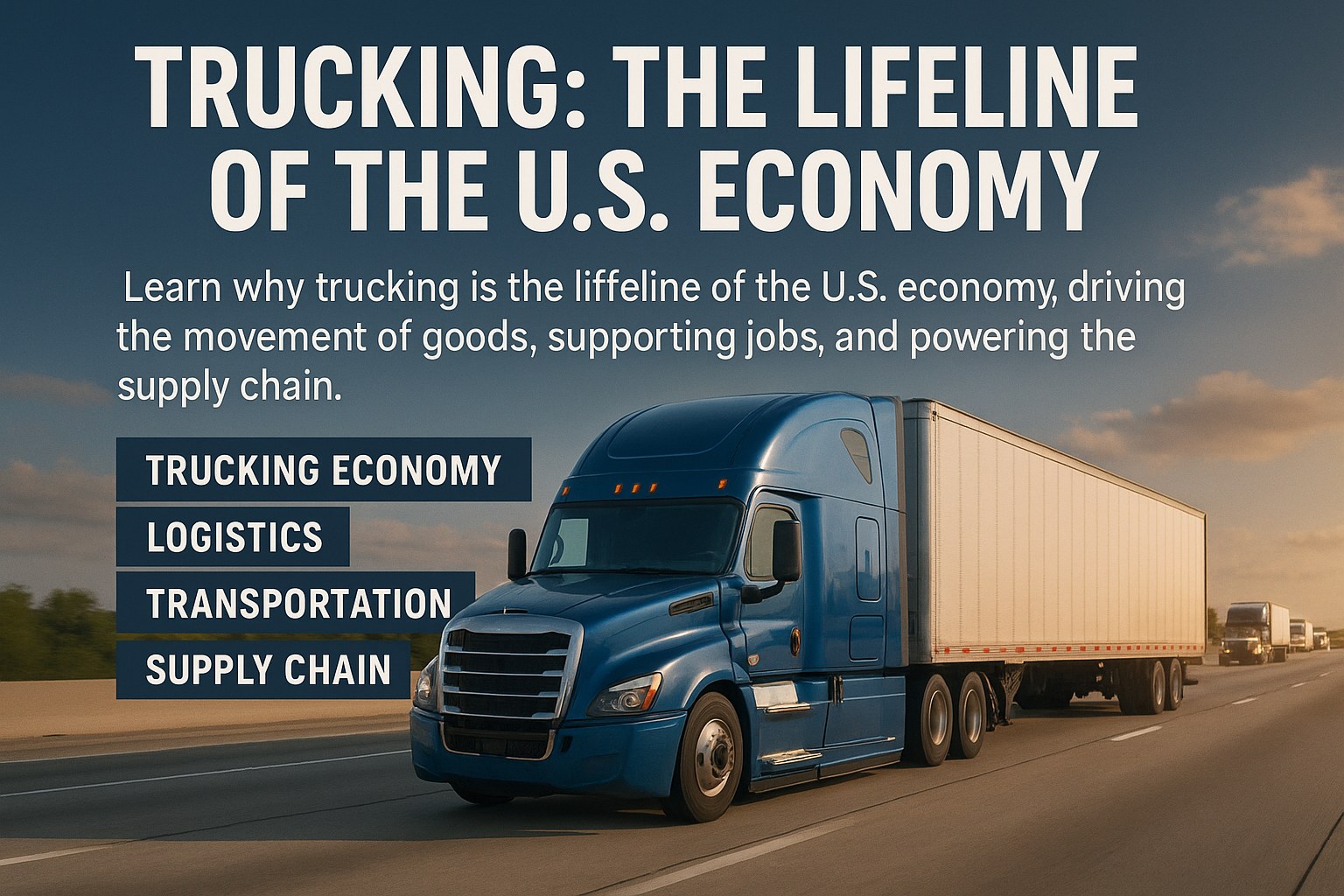Why Winter Storms Create Hidden Profit Opportunities
While most view winter storms as profit destroyers, data reveals a different story for prepared fleets. Surge pricing during severe weather events can increase rates by 40-80%, and customers pay premiums for reliability when their supply chains face disruption. The secret isn't avoiding winter—it's mastering it through technology, training, and strategic operational adjustments that keep trucks moving safely when others can't.
47%
Rate increase during storms
$8,500
Extra revenue per truck/week
73%
Fewer competitors operating
3.2x
Customer retention rate
Proven Strategies to Maximize Winter Storm Profits
1. Pre-Storm Positioning and Route Optimization
24-48 Hour Advantage WindowStrategy Focus: Strategic pre-positioning before storm systems
Profit Impact: 35% higher load availability at premium rates
Implementation Cost: $500-1,000 per truck in planning tools
Use advanced weather forecasting to position trucks ahead of storms, securing high-value loads before roads deteriorate. Fleets report capturing 2-3x normal rates by being first to market with available capacity in storm-affected regions.
2. Winter Equipment Investment and Maintenance
ROI in 1-2 Storm EventsStrategy Focus: Premium winter equipment and preventive maintenance
Profit Impact: 89% uptime vs 52% industry average
Implementation Cost: $3,500-5,000 per truck annually
Invest in automatic chains, premium winter tires, enhanced heating systems, and cold-weather fluids. Fleets with comprehensive winter packages operate when others park, capturing emergency shipments at 60-100% premiums.
3. Dynamic Pricing and Contract Flexibility
40-80% Rate PremiumsStrategy Focus: Weather-based surge pricing models
Profit Impact: $125,000+ additional revenue per storm
Implementation Cost: Pricing software at $200/month
Implement dynamic pricing that automatically adjusts for weather severity, road conditions, and capacity constraints. Include force majeure clauses allowing rate adjustments during extreme weather while maintaining customer relationships.
4. Elite Winter Driver Program
67% Fewer Weather IncidentsStrategy Focus: Specialized training and incentive programs
Profit Impact: $45,000 saved per prevented accident
Implementation Cost: $2,000 per driver training investment
Create an elite winter driving team with advanced training, higher pay scales, and performance bonuses. These specialists handle high-value winter routes, maintaining safety while maximizing storm-period revenues.
5. Strategic Customer Partnerships
Year-Round Premium ContractsStrategy Focus: Guaranteed capacity agreements for critical shippers
Profit Impact: 25% higher annual contract values
Implementation Cost: Relationship development time
Secure premium contracts with shippers needing guaranteed winter capacity. Healthcare, retail, and manufacturing clients pay 15-25% above market rates year-round for assured winter performance.
Transform Winter Challenges into Profit Centers
Equip your fleet with advanced weather management tools and strategies. Turn winter storms from obstacles into opportunities with comprehensive fleet optimization.
Winter Profit Maximization Framework
| Revenue Stream | Normal Rate | Storm Rate | Profit Increase |
|---|---|---|---|
| Emergency Freight | $2.50/mile | $4.50-5.00/mile | 80-100% |
| Expedited Delivery | $3.00/mile | $4.80-5.50/mile | 60-83% |
| Dedicated Routes | $2.25/mile | $3.15-3.60/mile | 40-60% |
| Spot Market | $2.00/mile | $3.20-4.00/mile | 60-100% |
| Recovery Services | N/A | $150-300/hour | New Revenue |
| Average Revenue Increase: 35-45% during winter months, with top performers achieving 60%+ gains | |||
Essential Winter Profit Technologies
Weather Intelligence Systems
- 72-hour precision forecasting
- Route-specific weather alerts
- Real-time road condition data
- Profit opportunity mapping
ROI: 35% revenue increase
Fleet Winterization Tech
- Remote engine block heaters
- Automatic tire chain systems
- Battery management systems
- Fuel additive monitors
ROI: 89% uptime rate
Operations Optimization
- Dynamic routing algorithms
- Surge pricing automation
- Driver performance tracking
- Customer communication portals
ROI: $8.5K per truck/week
Winter Profit Implementation Timeline
Phase 1: Pre-Season
September-October
- Complete fleet winterization
- Train drivers on winter protocols
- Negotiate surge pricing contracts
- Test all weather systems
Phase 2: Early Winter
November-December
- Monitor weather patterns
- Build emergency freight relationships
- Position equipment strategically
- Refine pricing models
Phase 3: Peak Season
January-March
- Execute surge strategies
- Maximize premium routes
- Track profit metrics
- Adjust tactics real-time
Phase 4: Review
April-May
- Analyze season performance
- Calculate total ROI
- Document best practices
- Plan next season improvements
Common Winter Profit Challenges
❌ Driver Resistance to Winter Operations
Challenge: Drivers avoiding winter routes due to safety concerns
Solution: Implement $500-1,500 winter warrior bonuses, share storm profits through percentage incentives
❌ Equipment Failure in Extreme Cold
Challenge: Breakdowns during high-rate periods
Solution: Invest $5,000 per truck in redundant systems and premium cold-weather equipment
❌ Customer Pushback on Storm Pricing
Challenge: Resistance to weather-based rate increases
Solution: Pre-negotiate weather clauses, offer guaranteed capacity at moderate premiums
❌ Inadequate Weather Intelligence
Challenge: Missing profit opportunities due to poor forecasting
Solution: Invest in professional weather services with route-specific predictions
❌ Insurance and Liability Concerns
Challenge: Higher premiums for winter operations
Solution: Document safety protocols, maintain perfect records for premium discounts
❌ Cash Flow During Preparation
Challenge: Upfront investment before revenue generation
Solution: Equipment financing, phased implementation, early contract negotiations
Ready to Profit from Winter's Challenges?
Join elite fleets turning winter storms into profit centers. Implement proven strategies and technologies that deliver results when conditions are at their worst and opportunities are at their best.
Frequently Asked Questions
Well-prepared fleets report earning $8,000-15,000 additional revenue per truck per week during major storms. A 50-truck fleet can generate $400,000-750,000 in extra revenue during a single storm event. Annual winter premiums typically add 25-35% to total fleet revenue, with some specialized operators seeing 45-60% increases. The key is maintaining 85%+ uptime when competitors achieve only 40-50%.
Automatic tire chains ($3,000/truck) pay for themselves in 2-3 storms by avoiding manual chaining delays. Premium winter tires ($2,400/set) reduce accidents by 35% and enable operation in conditions that sideline standard tires. Engine block heaters with remote start ($800) prevent no-starts and reduce idle time. APU units ($8,000) ensure driver comfort without engine idling. Total investment of $14,000/truck typically returns $25,000+ in first winter.
Safety enhances profitability—fleets with zero winter accidents command 20% higher rates due to reliability. Implement go/no-go protocols based on specific conditions, not general forecasts. Use team driving for severe conditions, reducing accident risk by 60%. Invest in real-time coaching systems that alert drivers to dangerous behaviors. Remember: one accident can erase months of storm profits, while safe operation builds premium long-term contracts.
Emergency medical supplies command 100-150% premiums. Retail inventory for storm preparation pays 80-100% above normal. Manufacturing JIT deliveries offer 60-80% premiums to avoid production shutdowns. Food and beverage see 50-70% increases. Recovery equipment and supplies bring 100%+ premiums. Focus on relationships with hospitals, major retailers, and critical manufacturers for highest-margin opportunities.
Begin preparation in August—six months before peak winter. Equipment orders need 60-90 day lead times. Driver training requires 2-3 months for proper skill development. Contract negotiations for guaranteed winter capacity should start in September. Weather intelligence systems need October installation for November storms. Fleets starting late capture only 40% of potential winter profits compared to fully prepared operations.







